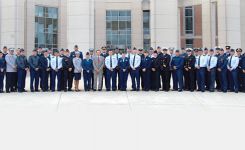- Daniel K. Inouye Asia-Pacific Center for Securi...
- APCSS Faculty Participate in Conference on U.S....
APCSS Faculty Participate in Conference on U.S. - India Relations
By Dr. Saira Yamin and COL Gregory Winston
Asia-Pacific Center for Security Studies (APCSS) Academic Chief of Staff Colonel Greg Winston and Associate Professor Dr. Saira Yamin participated in the United States Air Force Academy’s (USAFA) 55th Assembly as facilitators and panelist. Entitled “U.S.-India Relations: Partners in Democracy, the 55th Assembly was hosted by the Academy’s Political Science Department and was planned and conducted nearly entirely by cadets.
Held each year since 1959, the Academy Assembly is an undergraduate student conference co-sponsored with Columbia University's American Assembly. Occurring on the USAFA grounds, this conference provides a unique opportunity for graduate and undergraduate students from across the country and around the world to discuss a particular topic of contemporary significance. Student delegates are divided into roundtables and moderated by senior representatives from academia and government.
Despite the sub-zero temperatures and abundant snowfall, the February 3-5 program was exceptionally well executed. The event brought together USAFA cadets and more than 70 students from approximately 50 universities representing the United States, China, and India, among others. Presentations ranged from security to economics and from India’s domestic politics to the future of U.S.-India relations. Plenary sessions were followed by roundtable discussions that stimulated critical thinking and dialogue on various topics.
Speakers included prominent scholars, policy makers, and security practitioners, including: Mr. Vikram Singh, Deputy Assistant Secretary of Defense for South and South East Asia; Mr. David Bargueno, Secretary’s Office of Global Food Security, U.S. Department of State; Ms. Jacqueline Lundquist, Vice President of Corporate Affairs for Water Health International; Professor Sumit Ganguly, Indiana University in Bloomington; and Dr. Paul S. Kapur, U.S. Naval Post Graduate School, Monterey. Dr. Yamin served as academic panel member regarding U.S.-India counter-terrorism cooperation.

Photo caption: Dr. Saira Yamin in session with cadets and civilian students during a round table discussion
Colonel Winston and Dr. Yamin engaged with military and civilian students as leaders of round table discussions drawing on APCSS seminar facilitation strategies in critical thinking and dialogue. Students exchanged views on a host of relevant issues, including the implications of the recent U.S.-India diplomatic spat involving Indian diplomat Devyani Khobragade; the vicissitudes of U.S.-India defense cooperation; the seemingly intractable Kashmir dispute and resultant tension between India and Pakistan; regional counter-terrorism strategies; India’s forthcoming elections and the waning power of the Indian National Congress; the role of caste in India’s society; water management; food insecurity; opportunities for U.S.-India collaboration on poverty alleviation; the role of Afghanistan and Pakistan in South Asia, particularly in view of the pending NATO withdrawal; the impact of China and the future of U.S.-India relations, as well as a number of other critical issues.
Participation by Chinese and Indian students as well as the representation of both military and civilians U.S. perspectives contributed immensely to a lively dialogue. While the level of South Asian experience among the delegates varied, their level of interest certainly did not, with all inquisitive and engaged. Discussion on regional security dynamics and the simultaneously connected and competing roles of India, China, and Pakistan was especially charged. The question of what role the U.S. should play in the long simmering Kashmir dispute occasionally dominated seminar discussion sessions. The academic panel exposed delegates to a variety views about such contentious issues as drone strikes and how China’s growing economic and military role impacts policy and events in South Asia. There was much debate about the complex role Pakistan plays in regional security, particularly Afghanistan, both as a partner that has suffered significant casualties from the past decade of conflict, as well as a home base for some terrorist groups. Delegates representing the nations being discussed were able to share their own special insight into the nuances of domestic views on these topics.

Photo caption: COL Greg Winston sharing dinner conversation with cadets and civilian delegates.
In addition to the strong academic component, the Air Force Academy sought to make visitors aware of some of the unique aspects of cadet life as well. During the Assembly visitors toured the historic Cadet Chapel, a distinctive building that consistently draws the greatest number of tourists to Colorado Springs. Speakers and civilian students also received tours of cadet rooms, the dining facility, satellite tracking station, and air field. Spending two and half days almost entirely with the cadets provided visitors with an unusual opportunity to experience their lives firsthand, something that was especially eye-opening for those coming from civilian institutions.


